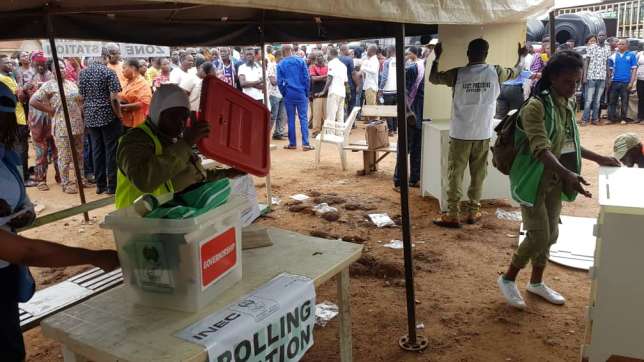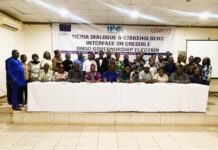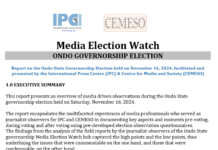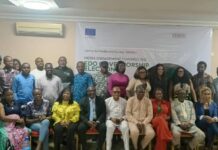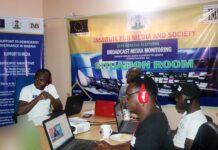The presidential, gubernatorial and National Assembly primaries continue to make news, revealing that democracy in Nigeria is still at some distance.
Lewis Obi
In less than four months, Nigerians would troop out to vote for a president, including an incumbent whose performance has been judged by the fairest assessment as average. He has not even bothered to express what he would do differently from the last three and a half years. He has not explained why he was short on many of the promises he made four years ago. To take an example, the pacification of the North East region, was expected to take a few weeks, and freedom of the Chibok girls was to be accomplished in a fortnight from May 29, 2015.
The All Progressives Congress, being the governing party has the privilege of incumbency and can afford to use its considerable propaganda organs and governmental activities to demonstrate its service. But the opposition parties have an array of ambitious politicians who have stated they are running to be president. Except for Alhaji Atiku Abubakar, who is perhaps the most experienced of the lot, having shared that presidential selection pedestal with Chief Moshood Abiola at the Social Democratic Party’s Convention in Jos, Plateau State, in 1993, other candidates have not found it expedient to educate the electorate why they want to be the next president, and, above all, why they should be considered as the best among a long retinue of equally qualified Nigerians.
This means that in four months Nigerians will vote, yet till date none of the candidates, including Alhaji Atiku, has deemed it expedient to submit any coherent economic programme, or plan, or proposition of any kind, a blueprint of what Nigerians should expect. There is no idea of how they will differ from the incumbent’s programmes in terms of employment, manufacturing, diversification, the oil industry, agriculture, mining, corruption and the environment. Nigeria is a country at war with jihadist groups, the Boko Haram and its spin-off, the Islamic State of West Africa. It is noteworthy that up till date, no presidential candidate has offered a proposal on how to fight the war and, above all, how to win it and finally bring peace to that troubled region of Nigeria. The fate of the Chibok girls which the President indicated was his first priority when he came to power has languished and only the Bring Back Our Girls Group (BBOG) seems the only organization trying so hard to keep the travails of those innocent girls in the public consciousness.
Nigerians are about to vote for presidential candidates who have not made a single speech that anyone can remember; who have not shared with Nigerians why they are passionate about serving the country and what they intend to achieve by serving the country. Nigerians are about to vote for candidates they do not know in any detail except, probably, that they have been rich through their public service as either governors of senators or ministers.
The contrast between an American presidential campaign and our current exercise is stark. At this stage, four months to the Election Day, the two candidates from the two major opposing parties would have emerged. Where a third candidate gains enough support to be eligible as a third candidate nationwide, he, too, would by now have made hundreds of speeches, met hundreds of interest groups for education, fundraising, dinners, debates, campaign appearances. Each candidate contends with 50 states and plans appearances in each state as many as are necessary to pump hands, for photo opportunities, special interest groups, lobbyists and local groups of different descriptions.
President Muhammadu Buhari was able to run four presidential campaigns. He failed in three and won in the fourth. It would hardly ever happen in the United States because a presidential campaign is too grueling, too intense with 22-hour days of no sleep, no rest. The rigor is such that sometimes the candidates even with their personal campaign planes hardly survive the punishing schedules without strong doses of multivitamins and other supplements, just to keep them awake or even to remember the name of the towns they are in, because, sometimes, they are so tired that they forget things as basic as that.
The presidential and gubernatorial and National Assembly primaries continue to make news, revealing and underlining, once more, that democracy in Nigeria is still at some distance. This is still the era of the warlords. The towns and cities and states owned by oligarchs who do not wish to disguise their enormous powers and their instruments of coercion. And when push comes to shove, people opt for life, and that has been the lesson of the political season. Lagos and Imo states are the epitome. But they are only remarkable because of the stature of the states. Otherwise, every Nigerian state seems to belong to one warlord or another or groups of warlords, or oligarchs in one form or the other. After nearly 20 years, and five election cycles, it has become abundantly clear that democracy has been turned and after Governor Akinwunmi Ambode’s concession speech you get the intimations of a man who has been through the Soviet Presidium.
The use of violence has not ebbed. Bianca Ojukwu’s rally Wednesday seems to have been invaded by armed men with the lovely lady fleeing and the rally scattered. This reminds one of the Offa robbery gang boss who had introduced himself as the Chairman of the Liberation Youths Movement, Kwara South. He has been working for the Senate President (Dr. Bukola Saraki) and Kwara State Governor Abdulfatah Ahmed as the political mobilizer of youths. Akinnibosun said he has been doing so for a long time, indeed, since Dr. Saraki was governor of Kwara State (2003 – 2011).
The unhappy journalists who interviewed him, (you could divine their state of mind from the tone of their questions), asked him to be specific, and to tell them exactly what he did for the Senate President. What type of work did he do for the No. 3 man in the Nigerian Federal Government? The gang leader answered directly that he and his gang mobilize and do what he called “political arrangement” for the Senate President in Kwara South. Not satisfied, the journalists then blurted: “Describe the work you do. What the Police PRO said has to do with Robbery (sic) and that is weighty. You are talking politics and that is light. What do you do for the Senate President?”
The gang leader then answered: “Where we can’t win, we make arrangement there. We scatter the election if we don’t win.”
The political arrangement for last Wednesday was to scatter the Bianca rally. That’s not democracy, quite a distance from it


